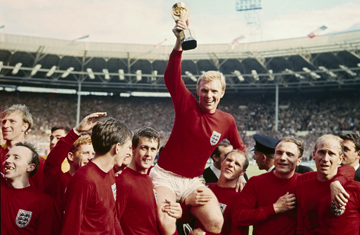
That was then Captain Bobby Moore holds the World Cup trophy aloft at Wembley in 1966
As Euro 2012 gets under way on June 8 in Poland and Ukraine, a number of countries have reasonable claims to the continental title. Spain, the reigning world and European champion, will try to become the first team to win successive Euro titles, behind the ball-possession clinics run by midfield maestros Xavi and Andrés Iniesta. The German side, full of entertainment at the young feet of Mesut Özil and Thomas Müller, also figures to challenge. Beaten World Cup finalist Holland has an argument to make, as does Italy.
Not England. "We have got to be a bit realistic," noted Sir Trevor Brooking, director of football for the Football Association (FA), which governs the game in England, in a recent interview. "For once, the expectations are not great because countries like Spain, Germany and Holland are more favored than ourselves."
But, Sir Trev, aren't they always? England's national side is football's most flawlessly reliable underachiever, serving up one calamity after another for nearly half a century since winning the World Cup, controversially, in 1966. England is the birthplace of modern football, the country that gave the game to the world and that today is home to the world's best professional league and some of its top clubs: Champions League winner Chelsea, perennial power Manchester United and rising contender Manchester City. Yet no matter how well or how badly the team is constructed and managed compared with other global powerhouses, England's media, and its legends, have stood ready to embrace the national delusion of footballing superiority — that every year is "our year."
That's why 2012's not-so-great expectations should come as a relief to England's wonderful, worshipful supporters, whose ranks have expanded well beyond a onetime core of lager louts to include virtually the whole country. England plays in Group D with France, co-host Ukraine and Sweden. It's a not particularly strong group, France being the exception, but then again, this is a particularly weak England. Its midfielders Frank Lampard and Steven Gerrard and central defender John Terry are creaking with age. The attack is missing its only first-rate striker, Wayne Rooney, suspended for the first two games of the tourney for kicking an opponent during a qualifying match.
There's been the usual soap opera in the run-up to the tournament. The recently named manager, Roy Hodgson, is considered a fallback second choice after the popular Tottenham boss Harry Redknapp. He's been in charge for barely a month, his appointment trailing the resignation of Fabio Capello, the previous manager, after he contradicted his overlords at the FA by sticking up for Terry, the team's serial delinquent and former captain. Terry goes on trial after the tournament for "racially aggravated public-order offense" for bad-mouthing Queens Park Rangers defender Anton Ferdinand during a match last year. Terry has denied the allegation. The FA may be a somewhat feckless suit collection with a lousy record, but it will not have its honor challenged.
Glory, Glory
If you cross paths regularly with England's supporters, as I do, you might find it quite logical to presume, as they do, that England is one of soccer's reigning powers. It's a passion that is bravely disproportionate to outcomes. Certainly, other countries have fans who are just as rabid. The Germans are as devoted as anyone to their Mannschaft. Orange-clad Dutch fans truly know how to have a good time watching the Oranje. Yes, soccer is way too important for the Italians to enjoy, and O.K., the French ultimately don't give a damn. But all those teams have at least won something since the advent of color television. Nevertheless, in England, the depth of expectation is oceanic. You have to admire that.
To academics, the expectations of England's supporters are understandable and deeply rooted in the history of empire and the notion of British exceptionalism. Great Britain conquered vast parts of the world in the 19th century and along the way created, codified and organized soccer to give the lads a little something to do between colonization campaigns. Britain ruled the industrial world too; its managerial class spread the game to South America.
National mythology is tough to shake, even when it is no longer apt or even appropriate. Earlier this year, David Richards, an FA board member, was speaking at a conference in Qatar, which will host the World Cup in 2022, when he launched an attack against the invaders who he claimed had "stolen" England's sport. "England gave the world football. It gave the best legacy anyone could give. We gave them the game," said Richards. "For 50 years," he said with a formidable combination of nostalgia and bitterness, "we owned the game."
That is, as they say, history. "It's a way of constructing our sense of Englishness," says Jonathan Grix, a senior lecturer in sport politics and policy at the University of Birmingham. "We had a glorious past. Football and football support keeps this narrative alive. We don't have that power in the world, so you invest it in something else." No wonder every England-Germany game becomes a distant replay of World War II. (Even if the Germans now win most of the time.)
